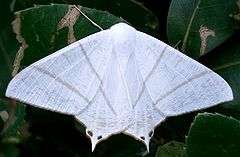Ennominae
| Ennominae | |
|---|---|
 | |
| Ourapteryx sp. | |
| Scientific classification | |
| Kingdom: | Animalia |
| Phylum: | Arthropoda |
| Subphylum: | Hexapoda |
| Class: | Insecta |
| Order: | Lepidoptera |
| (unranked): | Macrolepidoptera |
| Superfamily: | Geometroidea |
| Family: | Geometridae |
| Subfamily: | Ennominae (Duponchel, 1845) |
| Tribes | |
|
Abraxini | |
Ennominae is the largest subfamily of the geometer moth family (Geometridae) with some 9,700 described species in 1,100 genera. They are usually a fairly small moth species, though some (such as the Peppered Moth) grow to be considerably large. This subfamily has a global distribution. It includes some species that are notorious defoliating pests.
The status of several tribes is debated. For example, the Boarmiini are sometimes massively expanded to include the Bistonini, Bupalini, Erannini, Gnophini, Melanolophini, Phaseliini and Theriini. The Nacophorini and perhaps the Campaeini might need to be merged with the Lithinini, and all three might warrant merging into the Ennomini. The group sometimes separated as Cassymini is tentatively included in the Abraxini here. The Alsophilinae, usually treated as a small subfamily in their own right, might simply be a specialized lineage of Boarmiini. [1]
Selected genera
Tribe Baptini
Tribe Bupalini
Tribe Caberini
Tribe Campaeini
Tribe Colotoini
Tribe Erannini
Tribe Gnophini
Tribe Gonodontini
- Aethiopodes (sometimes in Odontopera)
- Odontopera
Genera incertae sedis
Numerous genera have hitherto not been definitely assigned to a tribe.[2] These include:
|
|
Footnotes
References
| Wikimedia Commons has media related to Ennominae. |
- Holloway, J.D. (1994): The Moths of Borneo: Family Geometridae, Subfamily Ennominae. London.
- Savela, Markku (2008): Markku Savela's Lepidoptera and some other life forms: Ennominae. Version of 2008-MAR-08. Retrieved 2008-JUL-21.
- Young, Catherine J. (2008): Characterisation of the Australian Nacophorini using adult morphology, and phylogeny of the Geometridae based on morphological characters. Zootaxa 1736: 1-141. PDF abstract and excerpt